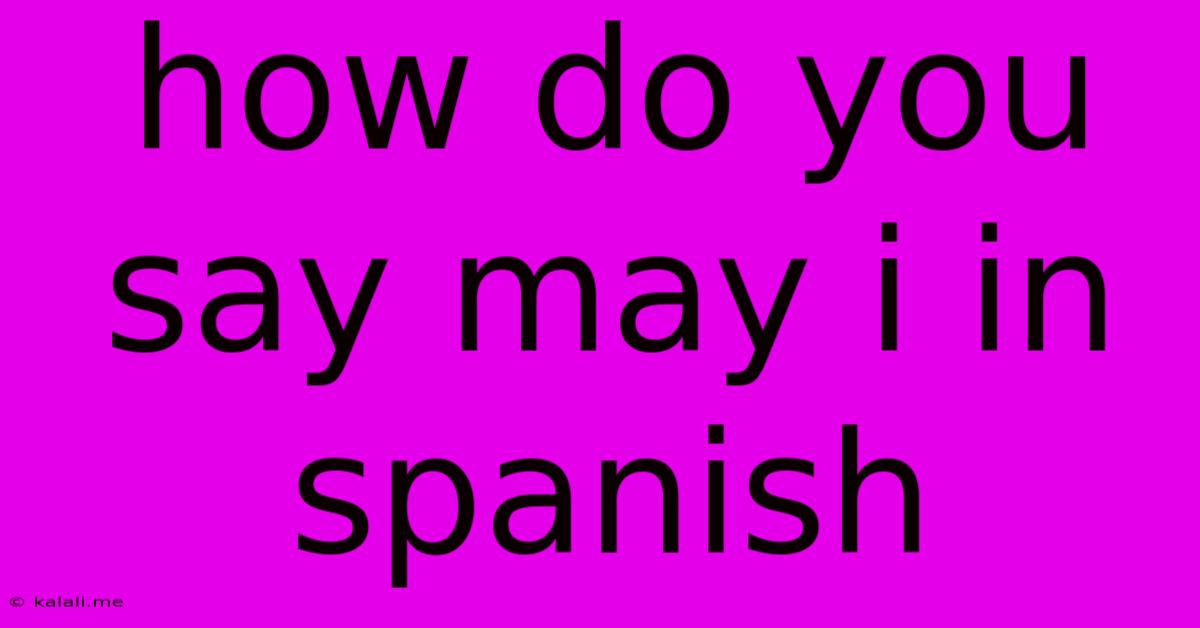How Do You Say May I In Spanish
Kalali
May 30, 2025 · 3 min read

Table of Contents
How Do You Say "May I" in Spanish? A Comprehensive Guide
Knowing how to politely ask for permission is crucial when learning a new language. This guide will explore various ways to say "May I" in Spanish, covering different levels of formality and context. We'll delve into the nuances of each phrase, ensuring you choose the most appropriate option for any situation.
The most straightforward translation of "May I" depends heavily on the context. There isn't one single perfect equivalent. Instead, Spanish offers a range of options, each with its own subtle implications of formality and politeness. Let's explore them.
Formal Options: Expressing Respect and Politeness
When addressing someone older, a superior, or in a formal setting, you'll want to use polite phrasing. These options convey respect and deference.
-
¿Puedo...? This is the most common and versatile formal way to ask for permission. It literally translates to "Can I...?" but functions similarly to "May I" in English. For example: "¿Puedo usar su teléfono?" (May I use your phone?). This is a safe and widely accepted choice in almost any formal situation.
-
¿Me permite...? This translates to "Do you permit me...?" and is even more formal than "¿Puedo...?" It shows a higher degree of respect and is appropriate for highly formal situations or when asking for a significant favor. Example: "¿Me permite pasar?" (May I pass?).
-
¿Sería posible...? Meaning "Would it be possible...?" this is a very polite and indirect way of asking for permission. It's suitable for situations where you want to be extra cautious and avoid appearing demanding. For instance: "¿Sería posible hablar con el gerente?" (Would it be possible to speak with the manager?).
Informal Options: Casual Conversations and Close Relationships
For friends, family, or informal settings, you can use more relaxed phrases. These options maintain politeness but are more conversational.
-
¿Puedo...? While also used formally, "¿Puedo...?" is perfectly acceptable in informal settings as well. Its flexibility makes it a go-to phrase for many situations.
-
¿Puedo...? (with added please) You can soften the request even further by adding "por favor" (please). This isn't grammatically necessary but enhances politeness. For example: "¿Puedo ir al baño, por favor?" (May I go to the bathroom, please?).
Specific Situations Requiring Different Phrasing
The best way to say "May I" often depends on the specific request. Here are a few examples:
-
Asking for something: "¿Me das...?" (Can you give me...?) This is suitable for simple requests, particularly with close friends and family. For example: "¿Me das un poco de agua, por favor?" (May I have some water, please?).
-
Asking for permission to do something: The phrases discussed above (¿Puedo...?, ¿Me permite...?, ¿Sería posible...?) are all appropriate, choosing the level of formality based on the context.
-
Asking for permission to enter: "¿Puedo entrar?" (May I come in?) or "¿Puedo pasar?" (May I pass?).
Mastering the Nuances: Context is Key
Choosing the right phrase depends on your relationship with the person you're addressing, the setting, and the nature of your request. While "¿Puedo...?" serves as a versatile option for most situations, paying attention to these nuances will allow you to communicate more effectively and respectfully in Spanish. Practice using these phrases in different contexts to improve your fluency and confidence in Spanish conversation. Remember, polite language always leaves a positive impression.
Latest Posts
Latest Posts
-
Include But Not Limited To Comma
May 31, 2025
-
How Much Is Eldritch Smite Damage
May 31, 2025
-
I Get Angry When I Cant Figure Something Out
May 31, 2025
-
Didnt Find What You Were Looking For
May 31, 2025
-
How Do You Spell About In Spanish
May 31, 2025
Related Post
Thank you for visiting our website which covers about How Do You Say May I In Spanish . We hope the information provided has been useful to you. Feel free to contact us if you have any questions or need further assistance. See you next time and don't miss to bookmark.